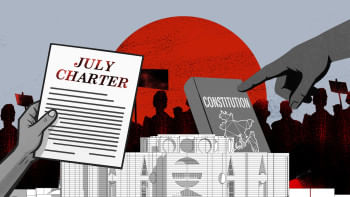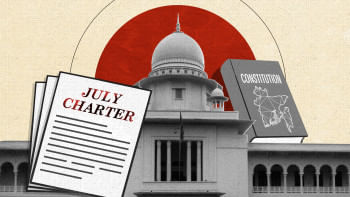Is the reform drive being derailed?

It is a telling reflection of our turbulent times that Bangladesh is as close to getting a July Charter (finally) as it is far from securing any political assurance of its implementation post-election. That is because while the National Consensus Commission reportedly plans to hand over a final draft to political parties within this week, it has opted to exclude its implementation process from the draft itself, as previously expected, fearing this may deter some parties from signing the charter. This cautious approach seems practical as parties still widely differ on the route to its implementation. Among the suggested routes are approval by next parliament, a referendum, presidential proclamations, and even a constituent assembly. Most parties, however, agree that some reforms can be enacted by ordinance right away, but beyond that, consensus breaks down into competing procedural preferences, especially on questions of constitutional reforms.
This state of affairs only underscores the fragility of a political patchwork that has been repeatedly strained by bitter divisions during the past months of NCC consultations. Beyond the debate on implementation, some parties also think that reforms on which there is disagreement should not even be incorporated in the charter. They have even warned that if the final draft includes anything beyond the unanimously agreed reforms, they may not sign it. This is deeply disturbing. To see this charter, in which so much time, effort, and emotion have been invested, still being dragged through such technicalities and calculations only heightens fears about the future of the reform drive.
During a recent event, the chiefs and members of several reform commissions have rightly expressed frustration at the lack of visible progress in the reform drive. Although 11 commissions were set up in two phases post-uprising—six in the first and five in the second—to drive reforms across various sectors, their outcomes so far remain negligible. The lack of progress in the 84 reform proposals earmarked for NCC consultations could be understandable, as they required broader political consensus, but how to explain the slow or zero progress on the dozens of other proposals that were not left to politicians and could easily be implemented? When will those proposed reforms be put into effect?
The interim government cannot blame political indecision alone for the current stagnation. Bureaucratic inertia, lack of collaboration and coordination among relevant state agencies, and the absence of clear timelines and accountability mechanisms have all contributed to this delay. The lesson of these past months is that without decisive leadership to translate reform proposals into action, even the most achievable reforms risk remaining on paper. We cannot let this situation drag on indefinitely. The interim government, political parties, and civil servants all bear responsibility to ensure that the reform drive is expedited so that the promise of change can be delivered.


 For all latest news, follow The Daily Star's Google News channel.
For all latest news, follow The Daily Star's Google News channel. 










Comments